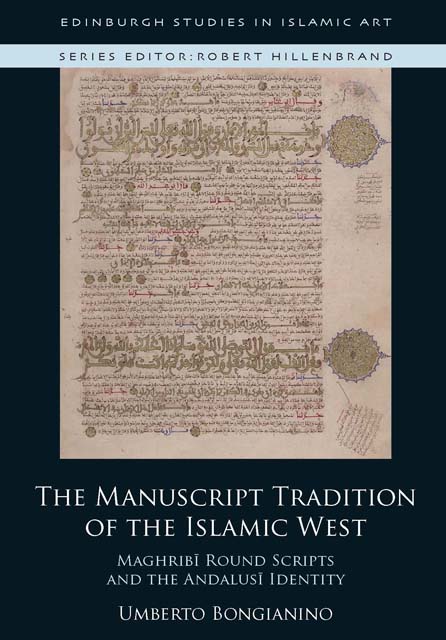Book contents
- Frontmatter
- Contents
- List of Figures
- Acknowledgements
- Note on Transliteration and Translation
- Abbreviations
- Series Editor’s Foreword
- Introduction: A Book about Books
- Chapter One Maghribī Round Scripts: A New Definition
- Chapter Two Maghribī Round Scripts in the Third/Ninth and Fourth/Tenth Centuries
- Chapter Three Maghribī Round Scripts in the Fifth/Eleventh Century
- Chapter Four Maghribī Round Scripts in the Sixth/Twelfth Century
- Chapter Five Beyond Books: Quranic Manuscripts and Chancery Documents
- Conclusion: Inscribed Identities
- I List of Dated Manuscripts
- II Titles and Genres of Dated Manuscripts
- III Copyists of Dated Manuscripts
- IV Places of Copying
- V Remarkable Colophons and Notes
- Glossary
- Bibliography
- Index
Chapter Five - Beyond Books: Quranic Manuscripts and Chancery Documents
Published online by Cambridge University Press: 18 November 2022
- Frontmatter
- Contents
- List of Figures
- Acknowledgements
- Note on Transliteration and Translation
- Abbreviations
- Series Editor’s Foreword
- Introduction: A Book about Books
- Chapter One Maghribī Round Scripts: A New Definition
- Chapter Two Maghribī Round Scripts in the Third/Ninth and Fourth/Tenth Centuries
- Chapter Three Maghribī Round Scripts in the Fifth/Eleventh Century
- Chapter Four Maghribī Round Scripts in the Sixth/Twelfth Century
- Chapter Five Beyond Books: Quranic Manuscripts and Chancery Documents
- Conclusion: Inscribed Identities
- I List of Dated Manuscripts
- II Titles and Genres of Dated Manuscripts
- III Copyists of Dated Manuscripts
- IV Places of Copying
- V Remarkable Colophons and Notes
- Glossary
- Bibliography
- Index
Summary
Maghribī round scripts and the Qurʾān
THE EARLIEST EVIDENCE for the adoption of Maghribī round scripts for copying the Qurʾān dates from the final years of the Umayyad caliphate of Cordova and the formation of the ṭāʾifa kingdoms. Prior to then, the Quranic manuscripts produced in al-Andalus featured angular calligraphic scripts belonging to the family of the so-called ‘ancient Abbasid scripts’, simply referred to as Kufic (‘khaṭṭ Kūfī’ or ‘Kūfiyya’) in medieval Andalusī sources. For example, the historian Ibn Fayyāḍ (or Ibn Abī al-Fayyāḍ, d. 459/1066) reports to have seen in Cordova 170 women copying the Qurʾān ‘in the Kufic script [bi-l-khaṭṭ al-Kūfī]’. This important reference attests to the continuation of the Andalusī Kufic tradition well into the fifth/eleventh century, alongside the introduction of Maghribī round scripts in the aesthetic domain of the muṣāḥaf (pl. maṣāḥif, meaning ‘Quranic codex’).
The Kufic Qurʾāns of the Islamic West
The specificities of the Andalusī Kufic tradition, differing from the Mashriqī one mainly in the system of notation and vocalisation, have recently received some scholarly attention: thanks to Alain George, a small group of fragmentary manuscripts kept in European and Middle Eastern collections has been convincingly attributed to the Islamic West, and probably to Umayyad al-Andalus. The study of these early parchment codices in horizontal format, copied in scripts related to Déroche's groups D.II and D.III, is still at an embry-onic stage: the holdings of many North African libraries – first and foremost the Qarawiyyīn (Figure 5.1) – await the systematic survey of specialists in early Quranic palaeography and codicology, which could shed better light on the relation between maṣāḥif penned before and after the introduction of Maghribī round scripts.
Meanwhile, the problematic labels of ‘Maghribī Kufic’ and ‘Western Kufic’ continue to be applied rather carelessly to different types of angular scripts used in Quranic fragments of North African provenance, but whose actual place of copying is far from clear. Needless to say, geographical designations such as these are of little use if not supported by textual or palaeographic evidence. One of these early Quranic scripts – Déroche's D.Vc – has even been considered a precursor to Maghribī round bookhands because of the swooping, semicircular shape of its final nūn and the curved tail of mīm.
- Type
- Chapter
- Information
- The Manuscript Tradition of the Islamic WestMaghribi Round Scripts and Andalusi Identity, pp. 277 - 356Publisher: Edinburgh University PressPrint publication year: 2022



